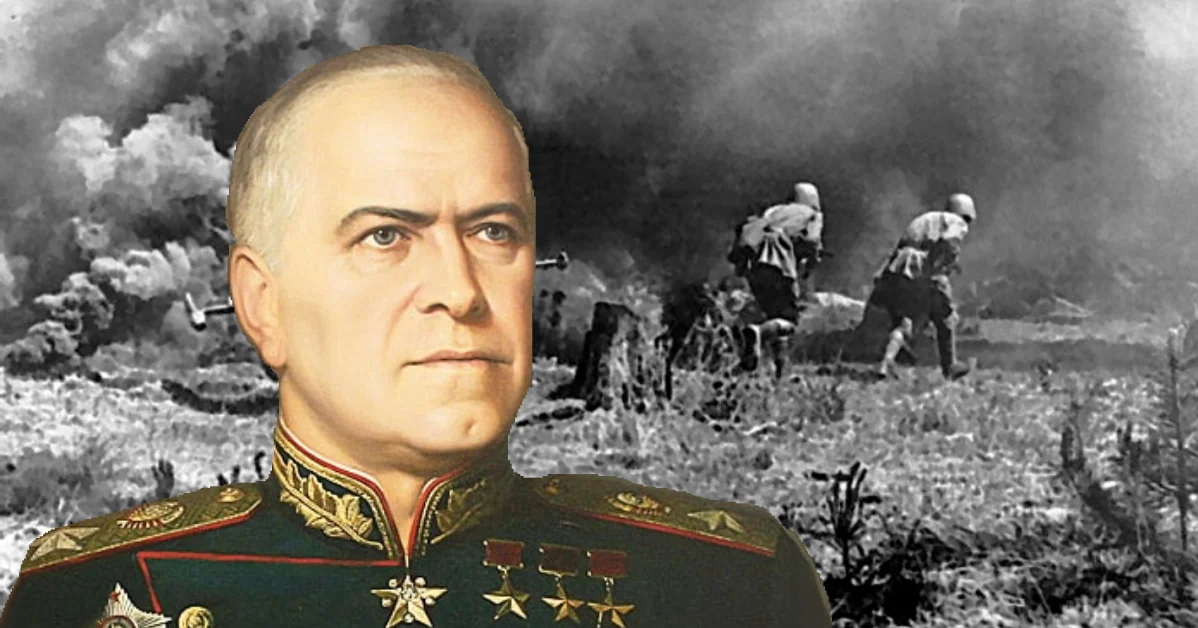A common phrase that characterizes its author as a cruel military leader is usually attributed to Marshal Zhukov. We checked to see if he said that.
Over the past decades, the quote has become firmly established in literature, the media and social networks. Not only civilians brought her in connection with Zhukov: “Gazeta.Ru", journalist Dmitry Gordon, prose writer Alexander Bushkov, but also such front-line soldiers as the writer Boris Vasiliev and Colonel Vladimir Safir.
And here’s what the screenwriter of the once cult series “Penal Battalion” Eduard Volodarsky said in his interview 2004 to “Moskovsky Komsomolets”:
“General Eisenhower writes in his memoirs how he saw a huge field near Potsdam, covered with the corpses of Russian soldiers. Following Zhukov's orders, they stormed the city head-on - under dagger fire from the Germans. The sight of this field amazed Eisenhower. He felt uneasy, and he asked Zhukov (not verbatim, but I vouch for the meaning):
- Why the hell did this Potsdam surrender to you? Why did you sacrifice so many people for him?
In response, Zhukov smiled and said (I remember these words, reproduced by Eisenhower):
“It’s okay, Russian women are still giving birth.”
In many sources about this episode, the emphasis is not on oncoming fire, but on the minefields that the penalty soldiers allegedly had to overcome on the orders of Zhukov.
On the Free Press portal the phrase attributed to to another marshal - Voroshilov - with reference to the director of the State Archives of the Russian Federation Sergei Mironenko. Mironenko himself interview In 2001, Komsomolskaya Pravda called the phrase “We need to save equipment, but women give birth to new soldiers” as “the famous words of a Soviet commander,” without specifying which one. Another probable author of the quote is Field Marshal Boris Sheremetev, who, in the joint book by Alexander Bushkov and Andrei Burovsky “Russia that never was - 2,” reassures Peter I after the unsuccessful assault on Narva (1703): “Don’t cry, sir! What you! Women are giving birth to new ones!”
First, let's look at the version of the origin of the phrase given by Eduard Volodarsky. In his interview, he talks about the storming of Potsdam. However, a serious contradiction immediately arises here. The fact is that, in fact, Georgy Zhukov met his American colleague Eisenhower after the victory over Germany, at the beginning of June 1945 in the Wendenschloss district of Berlin. That's what writes Zhukov himself talks about this:
“We met like a soldier, one might say, friendly. D. Eisenhower, taking me by the hands, looked at me for a long time, and then said: “So that’s what you are like!”
As for the above-mentioned memoirs of Dwight Eisenhower, they were reviewed by the famous journalist and expert Anatoly Wasserman in his article ““Women are still giving birth”: where and why did this Russophobic fake come from”:
“As you might expect, there is nothing similar in Eisenhower’s memoirs either. There is no episode where Zhukov allegedly told Eisenhower how he drove his soldiers to clear minefields with their feet. In fact, the author recalls discussing with Zhukov some of the battles in which they had to participate, and how they both came to the conclusion that not only military theory, but also their own combat experience proves: in the event that troops have reached the border of a minefield and the enemy is firing from the opposite side of this field, then an immediate attack through an uncleared field will entail fewer personnel losses than an attempt to stop and wait for the sappers to approach. And both were glad that they rarely had to make such difficult decisions.”
And indeed, if you look at the chapter entitled “Russia” of the Eisenhower translation memories, then we won’t see anything suspicious there. More precisely, the absence of even that humane discussion that Wasserman writes about, not to mention Zhukov’s cynical phrase, will be suspicious. However, if you turn to to the original, then it turns out that the chapter “Russia” is much more voluminous than its Russian translation. In particular, it contains the following fragments:
“His description of the Russian method of attacking through minefields turned out to be a great revelation for me. <…> Marshal Zhukov casually remarked to me: “There are two types of mines: anti-personnel mines and against vehicles and tanks. When we run into a minefield, our infantry continues to advance as if it were not there. We consider the losses suffered from anti-personnel mines as equal to those that we would have suffered if the Germans had decided to defend this area with a dense concentration of forces instead of minefields. The advancing infantry does not detonate anti-vehicle and anti-tank mines, so after it passes the minefield and is fortified on the opposite side, sappers follow them and harrow the passages through which vehicles can pass."
I had a clear picture of what would happen to any American or British commander who attempted such tactics, and an even more vivid picture of what the men in any of our divisions would say if we tried to make such practices part of our tactical doctrine.”
Thus, although Volodarsky’s version is not confirmed, Eisenhower, contrary to Wasserman’s statement, in his memoirs was indeed shocked by the Soviet tactics of passing minefields. At least that's what he claimed. Another mistake made by Anatoly Alexandrovich concerns the original source of the quote. Wasserman writes that it was the 1937 film “Peter the Great,” and then cites the above-mentioned conversation between Peter and Boris Sheremetev. However, if you open the corresponding episode, it turns out that the commander tells the sovereign a different phrase: “God is merciful, Pyotr Alekseevich! Enough people!”
Therefore, it is not surprising that Wasserman’s article has now been removed from the website of the Russian Military Historical Society, although it has managed to take root on many other resources.
As for the source where the quote was first attributed to Zhukov, two key publications can be distinguished in post-Soviet times. In 2001, Ogonyok published a fantastic story by Mikhail Weller “Tribunal", where the marshal pronounces these words in the presence of Gorky, Budyonny and several Decembrists. The marshal scolds the latter for the failed operation to overthrow the tsar. Weller's story can be considered the most widespread source of misconception.
And even earlier, on November 30, 1996, the Kommersant newspaper published article Maxim Sokolov “Beat, drum, and military flute, whistle loudly in the manner of a bullfinch,” dedicated to the Marshal of Victory. There is the following fragment: “Napoleon proceeded from the fact that cannon fodder, chair a canon, costs nothing or almost nothing. <…> Zhukov in this sense was no less brilliant than Napoleon, because the problem of saving his soldiers was rejected by him in principle - “the war will write off everything,” as well as “women will give birth to new ones.”
Sokolov’s article is quite possibly the earliest source linking the quote to Zhukov. However, did Sokolov invent the phrase himself? Definitely not. Even a superficial search convinces us that similar statements have existed before, both in fiction and non-fiction. Let’s not dwell on the variety of similar quotes in the literature of the mid-20th century, but let’s immediately go back to the times of the Russian Empire. That's what wrote in his diary, Russian general Andrei Snesarev on December 4, 1916, characterizing the situation at the front: “After all, with such losses, we will destroy the entire male population, and our brilliant strategist, the Russian woman, will not be able to give birth to new people to fill the empty ranks.”
IN memories Metropolitan Evlogy about the winter of 1904–1905 (the time of the Russo-Japanese War) we read: “But the patient cannot be convinced. “Women give birth to as many children as they want, but there’s only one rifle...” he objected gloomily.”
Alexey Suvorin in his letters of 1889–1903 wrote: “Even though the grain crisis is not beneficial to the landowners, the people are undoubtedly better fed and the women are giving birth to healthier children.”
And finally, the episode most similar in context refers to the same Russian-Japanese War and memories one correspondent about the words of Rear Admiral Pavel Ukhtomsky: “The admiral replied that such a loss did not mean anything. The division is 16,000 people, and as statistics show, Russian women give birth to this number of children within two weeks; therefore, this damage will be repaired soon..."
Well, all similar phrases are raised to quote Prince of Condé from Friedrich Schiller's "The Thirty Years' War": "One night in Paris gives life to more people than were killed in this battle." Perhaps this work was not the first of its kind, but Marshal Georgy Zhukov did not say anything like that. And if he did, no one documented it.
Incorrect quote attribution
Read on topic:
2. Dmitry Chernyshev. "Memoirs".
If you find a spelling or grammatical error, please let us know by highlighting the error text and clicking Ctrl+Enter.






